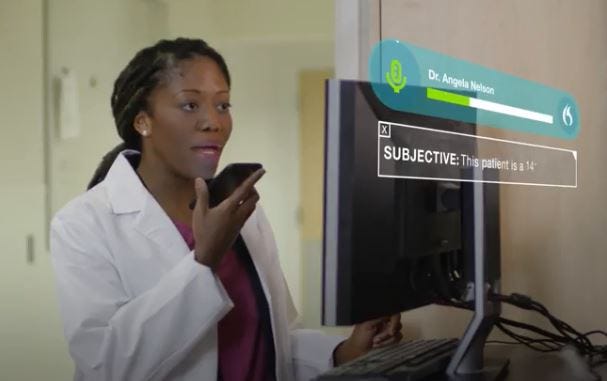Microsoft Boosts Conversational AI with $19.7 Billion Nuance DealMicrosoft Boosts Conversational AI with $19.7 Billion Nuance Deal
Nuance is poised to become Microsoft’s second largest acquisition behind LinkedIn.
April 12, 2021

Microsoft will boost its conversational AI capabilities considerably by acquiring Nuance Communications for $19.7 billion. Both companies agreed to the deal, announced Monday. It brings Nuance’s widely regarded natural-language processing assets to the Microsoft stack.
The Nuance deal is poised to become Microsoft’s second largest acquisition to date. The largest was when Microsoft acquired LinkedIn for $26.2 billion in 2016.
Founded nearly 30 years ago, Nuance is considered a pioneer in natural language processing (NLP) and speech recognition technology. In 2009, Nuance acquired IBM’s formidable speech technology assets. Nuance also helped Apple develop the voice recognition technology for the Siri digital assistant in its iOS mobile operating system. Nuance has a broad set of conversational AI technologies focused on health care, but also omnichannel engagement and productivity.
The deal is the outgrowth of a partnership formed by Microsoft and Nuance in late 2019. Initially, Microsoft tapped Nuance to expedite the delivery of ambient clinical intelligence (ACI) technology for the health care industry. Microsoft sees ACI as critical in advancing its Microsoft Cloud for Healthcare, which it launched last fall. In the U.S., 77% of hospitals use Nuance’s solutions, according to the company.
Microsoft’s effort to advance health care technology was a major reason to acquire Nuance. But the company has broader ambitions that fueled the deal.
Keep up with the latest channel-impacting mergers and acquisitions in our M&A roundup. |
During a call announcing the acquisition, CEO Satya Nadella described the potential of enabling ambient intelligence throughout the Microsoft stack.

Courtesy Nuance
“By combining Nuance’s deep enterprise AI expertise with the Microsoft Cloud, we will deliver powerful, next-generation services, and accelerate the growth of Nuance’s business, and drive growth across our complete tech stack,” Nadella said.
Augmenting Azure, Teams and Dynamics 365
Scott Guthrie, executive VP of Microsoft’s AI and cloud business, said Nuance’s technology will enable Microsoft to augment the conversational AI capabilities of its Azure cloud, Dynamics 365 and Teams.
“We believe we’ll be able to deliver AI-driven digital engagement solutions for any industry scenario,” Guthrie said. “Microsoft solutions like Dynamics 365, or Teams, can be augmented with new AI-powered capabilities, adding more intelligence to any customer engagement.”
Mark Benjamin, Nuance’s CEO, will remain in that role, and will report to Guthrie. Benjamin, who was also on the call announcing the deal, said Nuance has “pioneered speech technologies, natural language understanding and machine learning for more than 20 years, so AI is certainly in our DNA.”
Impact on Partner Ecosystem
Microsoft’s Guthrie said the deal will also open new capabilities for both companies’ partners.

Microsoft’s Scott Guthrie
“In the future, through our combined AI expertise, health care industry expertise and strong partner ecosystems, we can work with our partners in medical imaging to deliver AI and computer vision services for radiologists that reduce the time for imaging to diagnosis to treatment and add value throughout the imaging workflow,” he said.
“Beyond health care, Nuance and Microsoft can take their combined AI expertise to all industries by bringing conversational AI solutions like interactive voice response. Together with a breadth and depth of Microsoft Cloud portfolio, we believe we’ll be able to deliver AI-driven digital engagement solutions for any industry scenario.”
Likewise, Guthrie said Microsoft’s global cloud infrastructure will give Nuance’s technology …
… much greater scale, which partners will also enable.
“Our partner ecosystems will be able to build differentiated solutions leveraging both Microsoft and nuance capabilities,” he said. “Whether working with leading EHR providers like Epic and Cerner, or leading partners and other industries, Microsoft field and distribution channels will enable us to reach new customers in new segments and geographies, broadening the reach of Nuance’s technologies beyond the United States.”
Nuance’s Transformation: Enterprise AI and Health Care
During the past three years, Nuance has transformed its business and portfolio, Benjamin noted. Nuance has focused its technology on the cloud, with an emphasis on enterprise AI and on the health care industry.
“Clinicians, administrators and care teams in health organizations face challenges that multiply and intensify every year, making it increasingly difficult for providers to deliver consistently high-quality care,” Benjamin said. “Clinician burnout, declining patient satisfaction, increased financial pressures, growing administrative demands and obstacles to effective care delivery have had profound repercussions on patient care.”
The pandemic has made the issue that much more acute, he added.
Since forming their partnership in 2019, Microsoft helped Nuance develop a solution designed to capture conversations between patients and physicians. Nuance released Dragon Ambient eXperience (DAX), designed to helps contextualize those conversations for various purposes. For example, organizations can automate how information gets added to electronic health records (EHRs).
Benjamin said he believes the acquisition will benefit both companies and its respective stakeholders.
“Formally joining forces will amplify our ability to deliver products that shape the future of work help solve health care’s most pressing challenges and bring compelling value to our customers,” Benjamin said. “And with Microsoft’s cloud infrastructure, we can get our solutions into doctors’ hands even faster.”
Likewise, Benjamin believes Nuance will help advance Microsoft’s cloud strategy.
“Together, we will be able to address these and more opportunities to significantly accelerate the application of AI and speech recognition, natural language processing and intelligent engagement across industries,” he said.
Nitish Mittal, VP of technology at Everest Group, shares that view.

Everest Group’s Nitish Mittal
“The acquisition of Nuance represents the next move for Microsoft in its journey toward industry-based cloud solutions,” Mittal said.
It is noteworthy, that Benjamin will report to Guthrie, Mittal added.
“There will be natural adjacencies for Microsoft to pursue full-stack opportunities,” he said.
Biometric Security Expertise
Microsoft officials also noted that Nuance has advanced voice biometrics capabilities that provide voice authentication and fraud prevention. Nuance said its biometric services authenticate 8 billion activities annually, and 31 billion customer interactions pass through its solutions.
“Nuance’s biometric security expertise can bring new capabilities to solutions like Dynamics 365 Fraud Protection, enabling true omnichannel, end-to-end fraud protection for businesses and individuals alike,” Guthrie said.
Microsoft CFO Any Hood said the deal should close by year’s end, pending shareholder and certain regulatory approvals.
Read more about:
MSPsAbout the Author
You May Also Like


